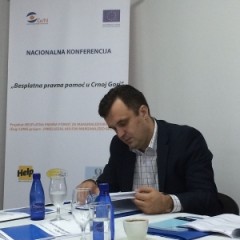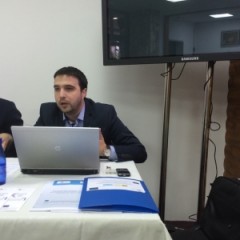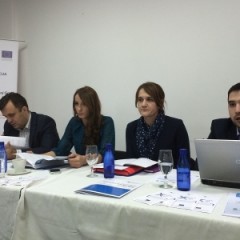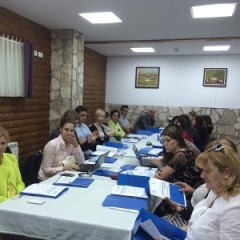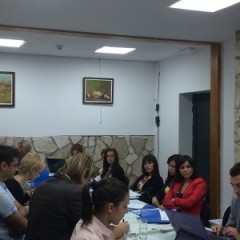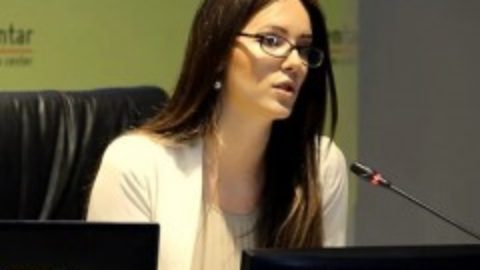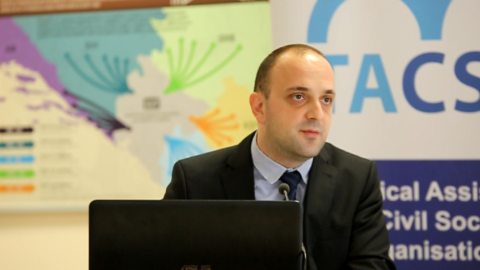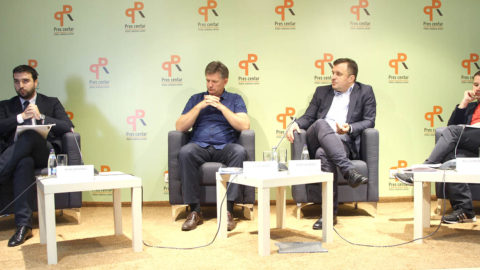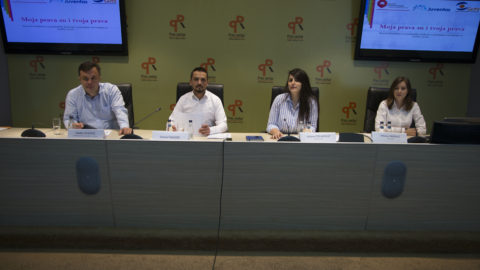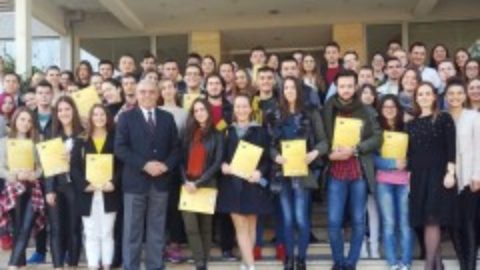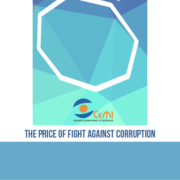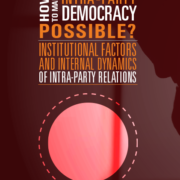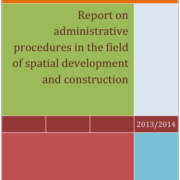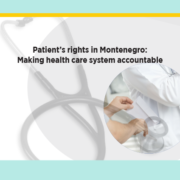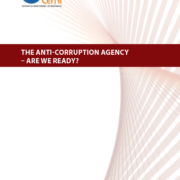Center for Monitoring and Research – CeMI, on June 30, 2014, organized a National Conference “Free Legal Aid in Montenegro” during which the Report on Free Legal Aid and the Study on the System of Free Legal Aid in Montenegro were presented. This conference was implemented within the project” Free Legal Aid for Marginalized Social Groups”, which CeMI implements with the financial support of the Delegation of the European Union in Montenegro.
The aim of the project is the improvement of the access to services and the insurance of equal treatment of the most vulnerable groups in the field of human rights through promotion and evaluation of effects in the implementation of the new Law on Free Legal Aid. The Study and the Report are one of the results of this project.
In the previous two-year period the country made significant efforts in securing real and efficient access to courts by introducing the institute of free legal aid. Establishment of the system of free legal aid in Montenegro is one of good examples of institutional action in a specific area since past effects can be assessed positively. However, the functioning of the system introduced certain problems in terms of the implementation of the Law and of the functioning of the existing system of free Legal Aid in CeMI’s opinion.
CeMI suggests the following recommendations for the improvement of the legislative and the institutional framework in the area of free legal aid:
• A possibility for the Law on Free Legal Aid to include a greater number of subjects authorized to provide free legal aid should be considered. It is necessary to recognize others as authorized providers of free legal aid apart from lawyers and services for free legal aid, for example non-government organizations dealing with human rights, syndicates, political parties, university legal clinics and other subjects who have the necessary legal knowledge and experience in the provision of legal assistance.
• In the context of considering possibilities to expand the circle of subjects authorized to provide legal assistance through new legal solutions, it is very important to define the form of free legal aid which can be provided by the authorities who are recognized by the Law as providers of free legal aid. It is important to mention that the Law must recognize non-governmental organizations as systemic and authorized providers of free legal aid, especially those organizations which have been providing legal assistance and working on the protection of human rights and interests of persons of different categories since the beginning of the implementation of the system of free legal aid in Montenegro. As a priority, there is a need to precisely define forms of legal assistance that non-governmental organizations provide, as well as the need for the establishment of criteria for non-governmental organizations who are authorized to provide free legal aid. It is also necessary to establish a Registry of non-government organizations providing free legal aid. Finally, it is necessary to mention once again that the granting of the status of authorized subjects for provision of legal aid to non-governmental organizations and other organizations of civil society can be potentially influential in relieving courts since individuals would, through legal counseling, be educated in overcoming legal problems through out-of-court procedures.
• With the aim to regulate the granting of legal assistance of all subjects who have authorization to provide free legal aid it is necessary to regulate the forms of free legal aid which persons authorized to provide legal aid can provide. In this context, we direct you to the decision contained in the Draft of the Law on Free Legal Aid of the Republic of Serbia, according to which a distinction between forms of legal aid that specific authorized persons for providing free legal aid can provide is made. In accordance with this, primary legal aid can be provided by lawyers, public notaries, mediators, representatives of services for legal assistance formed within local government units, representatives of associations and legal clinics in the process before a state entity or organizations who have the right to execute public authority, representatives of associations in the case when they have the right to appeal because of the violation of rights and freedoms of other persons in accordance with the provisions of special laws, representatives of association who can act as mediators in disputes where decision concerning rights, freedoms and interests is being made, based on the law of the member of the association in accordance with the provisions of special laws. In addition, the Law on Free Legal Aid of the Republic of Croatia contains a solution in accordance with which the difference between certain forms of free legal aid that specific subjects can provide is made for subjects authorized to provide free legal aid. In accordance with this, primary legal aid is provided by services, authorized associations and legal clinics while secondary legal assistance is provided by lawyers.
• The Law indirectly prescribes the right to free legal aid to persons who have this right guaranteed by the provisions of the Hague Convention on Civil Aspects of International Child Abduction and the Convention on Recovery Abroad Maintenance. Moreover, victims of torture and of discrimination need to be recognized by the law as prioritized beneficiaries of the right to free legal aid.
• Victims of all forms of domestic violence which the Law on Protection of Domestic Violence recognizes need to be acknowledged as prioritized beneficiaries of free legal aid in the sense of the Law on Free Legal Aid;
• Since the practice has shown that the courts can hardly respect the legal term to make decisions on granting of free legal aid within 15 days of the submission of the request for free legal aid, it is necessary to provide technical conditions for an unobstructed flow of information in the possession of other institutions towards the officials who work in the offices for free legal aid, when this information is of significance in determining financial status of the applicant. The reason for this is that a significant number of cases of disputes ended later than they should have due of inefficient communication between the court and the competent authority. Establishment of a database connecting data of the courts with the data of competent state institutions (primarily of the Direction for Real Estate, Central Depository Agency and Tax Administration Office) would contribute to the improvement of the efficiency of the work of the offices for free legal aid and create conditions for respecting deadlines for the decision-making based on the requests for the granting of free legal aid.
• It is necessary to reconsider models of gradual construction of the system of free legal aid for citizens in relation to administrative proceedings. In the beginning, it is necessary to develop mechanisms of providing free legal aid to citizens when the decisions concern the protection or the exercise of the right in, for example, the area of social and health protection, pension insurance etc. In this way, we can contribute to the gradual harmonization of the right to free legal aid with the international standards contained in the documents of the legal practice of the EU with the national legislation before the Montenegrin accession into the EU.
• The Bar Association should work on revising the list of the lawyers who will provide free legal aid and make sure the list is primarily based on the lawyers who have provided free legal aid so far in multiple instances.
• One of the downfalls in the functioning of the system of free legal aid is inadequate access to the offices for free legal aid for persons with disabilities. This is why it is necessary to create conditions for the availability of the offices for free legal aid to persons with disabilities. In this way there will be improvement of the respect of the right to access to court as one of the basic components of the right to a fair and righteous trial.
• Expert associates and those employed in the Offices for free legal aid should use the possibility of providing initial legal counseling more, so that they can filter the requests of the future beneficiaries of free legal aid and decrease budgetary expenses in cases where it is needed to do so, especially when referring to legal counseling. This is especially significant in terms of directing of the party to peaceful conflict resolution and the lessening of the burden on the courts in cases when the dispute cannot be solved through mediation.
• Taking into consideration public opinion polls conducted during the second year of the implementation of the Law on Free Legal Aid, especially the fact that almost 70% of the citizens did not know about the existence of the Law on Free Legal Aid, it is necessary to intensify the activities relating to the promotion of the system of free legal aid in the following period. Promotion activities must be implemented in local communities – in cooperation with the courts and non-government organizations working on protection and promotion of the rights of different social categories.
• It is necessary to revise academic programs of the legal clinics within the Law Faculties in Montenegro, on the basis of the programs of the universities in Europe and the United States in which the provision of legal assistance through legal clinics has been conducted for decades. Thus, a priority is the establishment of legal clinics in which young practicing in the final year of Law school will, under supervision of professors and legal practitioners (judges, lawyers, prosecutors, notaries) be able to gain practical experience by working on concrete cases and be able to provide legal assistance to different categories of citizens and thus prepare themselves for their future professional engagement.
CeMI considers that it is necessary to intensify activities related to the promotion of the system of free legal aid in the following period.
The conference, which took place in Zabljak on the 31st of June, was attended by the officers for free legal aid from the Basic Courts in Montenegro, by the representatives of the Ministry of Justice, by the representatives of non-government organizations and by lawyers engaged within the project.


 Montenegrin
Montenegrin